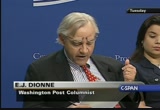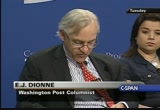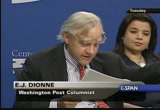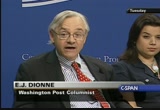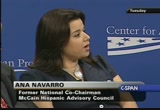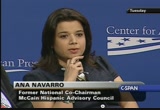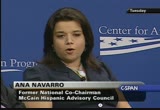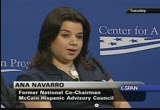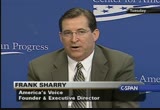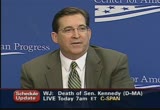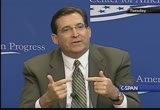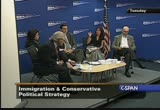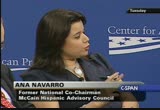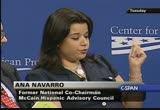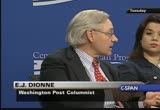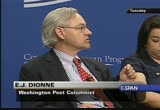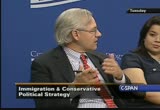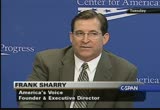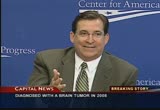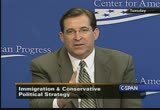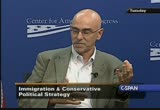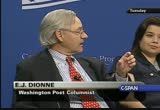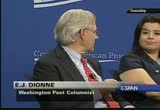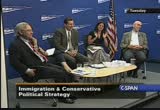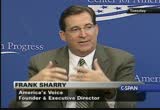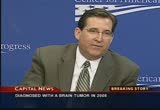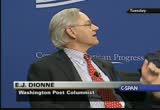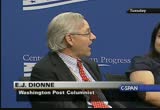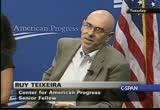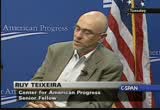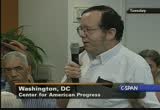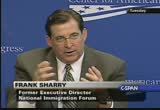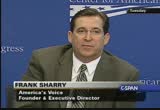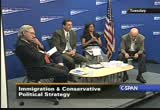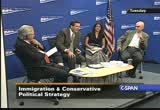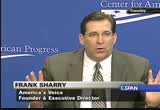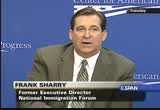tv Today in Washington CSPAN August 26, 2009 6:00am-7:00am EDT
6:00 am
6:01 am
in thosy districts and that i think the fact that you had a large hispanic vote in certain areas makes it easier at the presidential level to support comprehensive immigration reform. ambivalence. you can with immigration, beware of polling because you can make polls say almost anything you want about immigration because of this group. so for example, there was a greenberg both in 2007 that showed 52% approving deporting all illegal immigrants and 64% saying we should allow illegal immigrants who pay a fine and learn english to be eligible to
6:02 am
apply for citizenship. some folks gave yes answers to both of those questions. that is ambivalence. some favor entrance to state colleges where tuition is subsidized for children of illegal immigrants. some said yes to use emergency room. and a smaller percentage said -- what advocates of reform have to deal with. their success will depend upon winning over those in the ambivalent middle and not treating them as racist. the core argument for reform i believe must be that the presence of so many illegal migrants without enforcible rights undermines the rights of
6:03 am
all of us. the real message is that a path to citizenship is a way of guaranteeing that all residents of our country be able to assume their responsibilities as americans. moving us in that direction is not about doing favors for illegal immigrants, it's about strengthening the american community. i believe that the president is buying himself time to make that case. thank you. [ applause ] >> ana, you want to share thoughts and we'll get to a discussion. >> well, you know, i was coming here completely ready to agree that we were coming to the end of a cultural war and then i read the front page of the "new york times." there was a story about bob from georgia who in 62 years of life had never felt enough emotion about anything, not even the vietnam war to protest.
6:04 am
much to his wise shock, he showed up at a town hall on healthcare reform this week and the very soft spoken, nice man from georgia told the congressman he wanted him to oppose healthcare reform. we have not traditionally looked at healthcare reform as one of the wedge issues. we like to think of immigration and healthcare and from immigration and gay marriage and stem cell, but who would have "thu "thunk"it. i would say democrats are in a cultural war with themselves. you have liberal and moderate democrats protesting against each other. in florida you have statewide protests going on against the senior senator of florida, bill nelson, who could not be more moderate and middle of the road. there is some sort of -- you
6:05 am
don't want to call it a war, let's call it battle. there is something going on that has ignited the american public. now on immigration i think you're right. i think immigration has not been a wedge issue. it has not been a wedge issue in the presidential primary. the reason it hasn't been a wedge issue and to their credit and i know not enough time has passed by yet to say anything slightly positive about george bush or karl rove without having to confess to a higher diety, but the reason immigration reform was not a wedge issue in 2000 to 2004, there was no fertile ground for it from karl rove and george bush, who came from texas and understood that was just a nonstarter. there was a lot of focus and a lot of other wedge issues that did influence, not only the presidential election, but also
6:06 am
local election. then in 2008, it was also not a fertile issue, there was no fertile ground for this issue. it played in the primary and i sit here today telling you that immigration probably cost mitt romney the florida primary, which in turn was a pivotal moment in the election in the u.s. how could you have immigration of wedge issue when you have john mccain as your republican nominee? if it was an issue at all, as they have said, it was in the hispanic press and it was who was more believable on immigration reform and who was more believable in the promises they were going to deliver. i told john mccain so many times during the election, tried to convince him to no avail that the latinos wanted to hear a timeline. they were -- they have so badly,
6:07 am
the latino immigration activists wanted to know would it be simultaneous, would there be enforcement first, will there be legalization first, was it going to be within one year? john mccain did not want to commit to a timeline. he thought it it was irresponsible. he thought he wouldn't be able to control the legislative calendar. barack obama committed to a timeline. he committed over and over and over again. there is probably half a dozen, at least, television interviews where he committed to doing it within the first year. guess what, folks? just a couple of weeks ago in the shroud of darkness in the middle of the summer in mexico city he announced that it is not going to happen in the first year. i couldn't help but think what would have is happened if john mccain had committed to a timeline, had won the election and had not committed to that. so i think immigration, i hope
6:08 am
immigration disappears completely as wedge issue because i hope immigration reform gets approved. if it doesn't get approved, will it it become a wedge issue? will it make a comeback? will the wedge issue not be antis and pros, but rather you promised and you didn't deliver. it would be a good issue again for republicans if that were to be the case. angie opened this up by saying, you know, what the republicans need to do if they ever again want to win office. what do they need to do on immigration reform? the question is with democrats in the white house, democrats in the senate and democrats in the house, what do democrats need to do to hold on to that latino vote that put them in power. that is my angle. >> well, done, ana. all right. let's open it up, guys.
6:09 am
[ applause ] >> well, earned round of applause, ms. navarro, thank you. what do you think are democrats going to deliver? what about e.j.'s analysis? >> i think ana is right, if democrats squander the opportunity with latino voters, it will be a big mistake. i don't think latino voters will support deporting their loved ones. i don't think there will be a swing to the republican party. when the party loses turnout will matter a big deal and i think that if democrats haven't delivered on immigration reform you could see that impact latino immigrant turnout in a way that could have down ramifications and i know democratic operatives are concerned about it and i think if obama doesn't move and get it done and thinks ma2011 is
6:10 am
a better time to do it, i think our experience with george w. bush, the longer you wait, the harder it it gets, we'll see. i can't imagine if they lose seats they will come back in 2011 and say, now we will go with immigration reform and get it it done. i think if you imagine a 2012 presidential run in which barack obama's campaign promise in spanish is: this time i mean the promise. [laughter] >> it it will be hard to fire up millions of voters who turned out for the first time in 2008 to turn out again. i think it is a big problem for t the democrats. i question the same dynamic as healthcare, blue dog and conservative democrats will rise to the occasion because of the sense that maybe this doesn't play well in their district. e.j. rightly points that out and he also points the way. democrats have to realize the culture wars are receding and
6:11 am
they were hired not to be republicans, but to lean into tough issues and have pragmatic solutions. i've seen more focus groups with independent voters than i want to admit. i kept looking to see where are the closet racist in the group? there are sometimes a couple, but they are practicing mattists, they want solutions. that is why the polling -- the senator did on immigration reform shows increase in support for a path of citizenship because people want this new gang to deliver. and i just think the democrats are going to have to embrace that with an argument as e.j. says. quite frankly it should be about taxes. we are going to make sure people get legal, pay their fair share, employers and workers, it will help reduce the deficit. you don't hear that yet, but if approximate democrats leaned in and made that argument, require people to get legal, require
6:12 am
people to pay taxes and raise billions for the covers so everyone is paying their fair share. i would love to hear that argument from democrats saying, we're going to lean into it it. it is controversial, but we're going to get it done. that is the immigration party -- >> say they find their spine and their voice, e.j. hang on to your thoughts. what is the republican response to that? if you have democrats leaning into it it, making a sound case for how we can raise taxes by requiring people to come forward and in fact enforce borders and have verification system that works. how do republicans respond? just curious what they doll with that. >> i think people are waiting for the leadership to lead f. and when they lead, i think the best thing republicans could do is come up with an agreement and get rid of the issue once and for all.
6:13 am
>> uh-huh. >> get it off the table so we don't have this constant fight we have to be defending with latinos and go back to what ronald reagan believes. latinos are republicans, they just don't know it yet. we can focus on all the other issues and you know what, if they can't get it done, if it can't be done, there's going to be -- it's going to be a hard case to blame it on republicans when so much control rests in the hands of democrats. i know the republican ads would be... i think republicans, i think democrats need to lead f. they don't, i think they are very vulnerable. i want to remind all those democrats who are now holding hands with latino leaders that a couple of years ago those latino and immigrant leaders were
6:14 am
camped out at john mccain's office and they know john mccain didn't want to make and deport them. they believe obama was a better sell for the immigration issue. if latinos are still swing voters they can turn on a dime. and they need to be courted and they need to be shown some meat, some deliverables. those same people that were -- the same leaders and activists camped out in john mccain's office and did not vote or support him could very well do the same to barack obama should they not feel he is fulfilling promises. it's a gauntlet and it's a very fine line they have to walk. >> e.j., what are your thoughts about reaching the ambivalent middle d. frank persuade you? >> i am persuaded about what he said about the last two campaigns and i do think there are arguments that have not been made that could be made in terms
6:15 am
of everyone assuming their responsibilities as citizens that have a broader appeal than other kinds of arguments. i agree with all of that. just some points. in terms of hispanic vote, the bush got the hispanic vote for republicans up to 44%. that was enormous achievement, as frank suggests. the split was between protestants and catholics. look at the evangelical endroads among hispanics where they voted strongly republican. one thing that happened to the republicans is backlash against republicans because of where so many were on immigration. they lost a lot of ground among the evangelicals who are the natural allies of the republican party. the republicans don't need to carry the latino vote. if they can get 40 to 45%
6:16 am
nationwide, they can win a lot of states and elections, but i think there are two problems here. one is politically as long as the republican parties loudest voice are identified, i think the message is latinos get at the grass-roots are message they get is that the republican parties will all be hostile to them. i think what you saw, what happened nationally is what happened in california when pete wilson pushed referendum to limit benefits that went to immigrants and he won an election on that, but he pushed the latino vote into the democratic column in california to this day. i think the danger for republicans is what has happened on immigration over the last several years puts them in danger, puts them in that same danger. the problem is an immigration bill. i just want to give one plug to a report that brookings, where i
6:17 am
work, one place i work, and the endenberg center did on the report of the media and the immigration debate. it was written by my friend roberto sira, banu aka, i always have problem with the name, wrote a fantastic analysis of media coverage and i did a polling analysis drawing on today. when you go back to the last battle in congress over immigration reform it is not just a matter of having guts and courage. it is that immigration reform, depending how you do it, splits the constituencies for it. one thing we concluded is that opponents of a bill were united clear because it's very easy to get to know. on the other hand, supporters of immigration reform were not completely happy with their own bill. there were huge splits for
6:18 am
example between those profavor a large guest worker program and others on the liberal side who say guest workers undermine the rights of other americans and is we need to move to citizenship. the very constituencies in favor of reform were ambivalent about the bill they were supporting and every concession you made to the restrictionist side undercut enthusiasm sound familiar from the healthcare fight? undercut enthusiasm from the bill so that this is very hard political and legislative task. i'm sure frank has solved all the problems and will tell us how, but i think we have to bear that in mind. it is not simply a matter of guts. it is a matter of coming up, it takes a lot of political and policy intelligence to put this thing together. frank, tell us how you solved this problem? >> we'll be living the scab is open for 2007. i think i led one of five
6:19 am
progressive groups that was for the bill. there were hundreds against it for various reasons. i think we're lucky chuck schumer is leading the way. the 2007 back room negotiations produced a bill that was just bad enough to anger every major constituency. i think chuck schumer will be good enough to come up with a bill just good enough to keep everybody at the table. that is number one. i think schumer will play a big role. i think people are humbled by the consequences of not getting ds. i know advocates that wanted to hold out for something better and realize what is happening on the ground, the status quo is so an atmosphere where immigrants live under such siege and with tremendous fear that there is a kind of commitment to reform that i don't think we saw a couple of years ago. i have to say, there is going to be a business labor split on this issue. of course, business saying we want more labor.
6:20 am
too many workers will undermine american workers. i hope we get to that debate. then you have people on both sides who want reform figuring out whether there is a commission to better manage all or part of of the flow or new reform of of the public and private programs. i can see a deal on that. i think the bigger concern is whether the forces of no are strong enough as -- i watched the healthcare reform debate. in is 2007 replayed. it is that play book. jena, grassroots activism make it look like they are speaking for the majority and try to encourage democrats to back off. there will be a primary challenger if you do. i get the play book. this is the challenge. are democrats going to be, you know, susceptible to the southern strategy of old or new democratic majority going forward? i think the demographics suggests they should lean in and show heart and backbone and
6:21 am
realize that in fact a lot of folks want results. that is what they really want. the idea that loud voices on the far right are going to intimidate people in the middle, to me i find unbelievable. so i think yes, you have a better message, frame it better, but i think going forward that obama and the democrats if they stood up and said, we're going to make sure people are legal and employers are following the law. stop illegal immigration and do it in a way true to our ideals that in fact if they led with the megaphone they had, they would find surprising support and i say this because we've done the deep polling in districts you would never imagine would support immigration reform, conservative districts. if framed properly, big if, if framed properly, democrats will find republicans willing to work with them, will get solid majority and could by the spring of next year. >> okay. >> optimism. >> ruy teixeira, what are your
6:22 am
thoughts? taking the analysis you have done and applying to the debate today with the backdrop of healthcare, what is your sense? >> ruy teixeira: my analysis is more about sort of the long-term shift in the terrain than about sort of what strategy should be pursued in congress tomorrow, which is above my pay grade, but i think i am largely sim pathetic to what frank is saying. i think the basis is there for moving forward on this issue. i think that while there is ambivalent middle, i think that ambivalent middle is interested in a pragmatic solution to this problem and again if it is framed right and pursued in a way that kind of speaks to people's concerns, but emphasizes the pragmatic problem-solving ability of it, this kind of legislation, i think it will be possible to make progress. one thing that is important for the republicans and this will split their party, it is really in their interest to take this
6:23 am
issue off the table and a long-term demographic stand to continue to be on the short end of the stick with hispanics. it is a very bad idea and a lot of smart people in the republican party know it is true. it is hard to see getting off the short end of the stick without getting this issue off the table and certainly they don't want to be identified so closely with the forces of no within their own party. they need to transscend that as much as possible. so that is the basis for some sort of solution. it is in political self-interest of a big section of the republican party to move forward in this. that doesn't mean for a lot of individual members for the republican party, particularly in pretty white districts with low hispanic concentration, they will not see their self-interest differently and that will create problems. these are the problems the forces of no will speak up loudly as this issue comes to the floor and you risk for them another debockel.
6:24 am
i think this beidadebate fit fa apart with no in the republican party, i think it hurts them again. i think it hurts them more than it hurts the democrats. i think we will see a replay of how this play with hispanics a couple of years ago. so i think it's difficult, but again i think the way the terrain is shifting and i think the political calculus of the republican party, i do think the basis is there for some sort of of solution. of course the fact there is a basis doesn't mean it will happen. it is hard to make a realistic assessment at this point. i think there is a good shot at making something happen. >> there is a lot more to the republican party than voices of no. i think we have got to be smart and responsible. you brought up the minority debate. yeah. we quickly saw the minority
6:25 am
debate be claimed and be defined by, as you call it, the voices of no and the republican party. let's look at who they are and figure out who they represent. when you are fanning the flames by putting the likes of tom cancrodo to talk about sonia sotomayor, a congressman who is no longer a congressman from, you know, the boonies in colorado and who got defeated soundly in the primary in the republican party and yet he is the one that put out there in mainstream media and it is his voice that is defining the debate on sonia sotomayor. why? because he's going to say things and going to make very entertaining questions and it will lead to more press and more stories. in the meantime, you had
6:26 am
practically every member of the judicial committee, every republican member making a very good point, causing a cordial and civil debate n. fact, i would tell you probably the person that knocked around sonia sotomayor the most was arlen specter, not a republican. and yet republicans took a beating with hispanics on sotomayor. >> most republicans voted against her. i mean in the end -- >> senator -- >> does anybody remember the things lindsay graham said or mel martinez's speech? he chose to make it his last official duty in the senate to cast a vote and give a heart-wrenching speech in defense of going back to the old times when supreme court nominees were judged on qualifications and intellect and it wasn't a trenched, entrenched position by both parties.
6:27 am
so you know, it goes above and beyond sotomayor and goes above going back to a time that frankly no longer exists. it will be hard to go back to, but how much press did mel martinez's speech, which i don't know if you read, but it it was an emotional speech. i was very proud of him for having given it. i'm very saddened that we are losing that voice of mel martinez in the republican party and i hope that -- i hope that at some point we again have another republican senator because i think it is that important. >> first thing, i was surprised how many republicans voted against sotomayor because i thought it was in their political and policy interest to vote for her, partly because i think she is one of the more conservative or moderate choices obama could have made. i think your case would be stronger if more of your friends actually cast a vote for her. i want to raise a question with
6:28 am
you because i think it is a difficult problem republicans had. when we did our stucky, andy cohut at pugh, put questions on a questionnaire for us and we found this fascinating split in the republican party. not surprisingly moderate to liberal republicans now or rather small minority of that party were in favor of a path to citizenship. comprehensive immigration reform by about two to one more or less. what was fascinating is self-identified conservative republicans were very badly split. some depended on whether you were more cultural conservative or business-oriented conservative. but what we found an extraordinary difference between talk radio listeners and nontalk radio listeners. if you were a conservative republican who listens to talk radio, you opposed a path to citizenship or amnesty, we use both word necessary different questions to measure, see what
6:29 am
the real measure was. 54-41 no. if you didn't get a lot of information from talk radio and you are a conservative republican, it was 62-34 yes. so there is this interesting dwigsz in the republican party and the other thing we found, the project for excellence and journalism study, is that during that debate conservative media and lou dobbs in particular whose effect was on conservative democrats, gave it far more attention than either of the main-stream media or liberal outlets, msnbc or liberal talk shows. i think again that went to the enthusiasm issue that the conservatives were mobilized and the other side wasn't. i do think there is a genuine division in the republican party on this. even deeper than the split which also exists among democrats. how do you view?
6:30 am
what is your sense of how republicans deal with that in the future? >> we have to come to an agreement. there has got to be an agreement that is not going to make everybody happy. it is not going to make everybody unhappy. and that can be approved. i i'm -- i really regret that senator kennedy is not going to be there as convener. senator kennedy was his prowess and his authority will not be there. i don't trust chuck schumer's role the way frank does as conciliatory convener of all the roles, but i can be persuaded, and i hope to be. but i think, like it or not, we're going to have to come to an agreement and get this issue off the table. >> but, is it john mccain? is you need a republican chuck schumer if a sense, if approximate that is conceivable.
6:31 am
apolo apolo apologies to chuck, i must say. i agree, kennedy's absence is felt in a lot of different areas, but i don't -- i do see this -- this is such a difficult issue for republicans. bush kind of made it work for a bit, but even push at the height of popularity couldn't make this work inside the party. >> i'm not quite clear who is going to lead this had if this issue comes up really in the senate. certainly there's some voices that are becoming leader in the house. i can tell you that lincoln, the congressman from my district from south florida, has become a leading voice in the house. in the senate, i have a hard time thinking of john mccain and chuck schumer playing in the same sand box. it better be a big sand box. that being said, i think john
6:32 am
mccain cares and i don't speak on his behalf, but i think he cares tremendously about this issue. but i think there's others. i think lindsay graham. >> it has been reported that senator graham. >> i would not be surprised to see lindsay graham take this on. he will work closely with john mccain. we all know the relationship between the two, but it might end up, something that ends up on lindsay graham's lap or somebody else's lap. >> i will ask one more question of the panel and open up to the audience. it is a policy question because we have talked a lot about politics. you have to find the sweet spot on the policy and it is complicated, right? there are four different parts to reform. you have to have enforcement that is effective and deal with the 12 million who are here without status, you need to have something to do with the families stuck in so that spouses are separated from each
6:33 am
other and address the issue of how many folks do we need to come to the country to work. what is credible way of assessing future flow to reduce or stop illegal immigration. let's talk about the legalization and the future flow question because i feel like those are two of of the biggest ones. can you two imagine agreement with democrat and republican on those two issues and what would it look like? >> go ahead, frank. >> last question, i didn't say it would be easy. >> i will not negotiate with myself on this. look. i think a broad generous legalization program, as much as it is pillerated amnesty, if it is framed right, designed simply and people have to earn permanent residence and work toward citizenship, i think it will be wildly popular after it passes. even though it will be wildly unpopular among the wing nuts and the talk radio folks leading
6:34 am
up to it and will create ambivence. i think if combined with enforcement measures that work tis framed as a way to solve this problem. i think democrats just have to lead with that and i think smart republicans will go with it. tougher issue is how to deal with future flow. it is combination of reform of existing programs, some sort of commission to analyze labor market conditions both in geographically diverse areas and different occupational sectors that will make recommendation to congress. congress the retain the authority, as it it must, but for now congress revisits the number issues every 20 years and the labor market moves faster and more dynamically than that. i think a well constructed commission that is making recommendations that can -- i'd like to go so far if well constructed to have a fast track to get decisions made. i suspect that will be too much for the political market to bear.
6:35 am
nefls, i think you have to revisit those issues and learn by doing. right now you have an osifide process and mras an advocate, it can go up and down or in different sectors. we have to be more realistic about how to combine the elements of labor market needs, wage impact and effect on reducing illegal immigration. if you have a fair read of those three elements you can come up with a process that can change dynamically as needed that will result in control, protection for american workers and reliable source of truly needed workers for programs. >> great. ana, what is your reaction to that policy construct? >> yeah, i agree with a lot of what frank has said, but i think there are red-flag issues that will have to be taken care of at the beginning before the bigger bill is formatted. i think for republicans, the
6:36 am
temporary worker issue is one of the red flag issues. we just saw, for example, jeb bush and mack mccarte, lead a commission of republicans and democrats, academics and business people, activists, practici pragmatists and come up with a plan in a matter of weeks, not a matter of years, under the council of foreign relations. i do think it it can happen, but you have to start from a place of wanting to make it happen. that's the key. the key is not letting this be coopped and taken hostage as a political pawn so it it benefits politically for it to fail. but rather starting from the place where it must succeed and failure is not an option.
6:37 am
>> well, said. >> there is irony during the immigration debate in 2007, senator bae said an interesting thing, he said it is much easier to sell this at a moment when vulnerable people in the economy, you know, native workers, are feeling more secure or are seeing us do things on their behalf. not only that. the irony is if we ever got universal health coverage, reducing economic insecurity on the part of a lot of people, there would be more openness to -- or less hostility when the immigration issue comes up. it has been threw throughout history. in the end america is pragmatic about immigration after having vicious fights about it. it tends to be the case that at times rising prosperity, not surprisingly, people are more open to flows of immigrants and when they are feeling
6:38 am
economically pressed, they tend to worry more. that unfortunately from frank's point of view and ana's point of view doesn't bode well because we are hardly in a time of economic security. i suppose this is a very -- you can't even call it good news, but changes the debate because considering -- yeah, may be a reversed flow because of of the economic downturn. all you need to solve the problem is a big economic crash, i guess. probably reduce global warming emissions, too. >> there you go. yes? >> you are right about the economic insecurity and feelings toward immigration, of course. but what it allows the obama administration to do that they really step up is to frame this. it is about the 12 million who are here. are we going to deport them or make them taxpayers and have them work toward citizenship so they fulfill their
6:39 am
responsibility of being members of the community. make sure we don't reproduce the problem and end up with 12 million more. if that argument is persuasive that we are going to clean up the mess called by inattention to this and make sure people get legal. make sure employers follow the law and make sure it doesn't happen again. that argument is made, i think actually the down economy and the fact illegal immigration is at net zero makes the debate focused on where americans are more prog mattic and more ambivalent about the idea of levels increasing going forward and i think they are becoming more majority is becoming consolidated around the idea. we will not deport them, let's make them taxpayers and citizens. i hope. >> why don't we open it up to the audience to ask some questions in the time that remains. if you wouldn't mind introducing yourself. >> peggy, i'm congressional
6:40 am
correspondent with hispanic outlook and with immigration and the american dream. comment and a couple questions. the comment is, i think you see a similar problem in the helt healthcare reform bills. it is all about how much government, you know. how much government seems to be the parsing out. some want government to do more and others them to do less. it is interesting how it presses out. lib tarrians and the democratic nationalists, that seems to be the split between the two party, not conservative and liberal, otherwise you can't explain kennedy and bush on the same page there. >> uh-huh. >> anyway, my question to mr. teixeira, you seem to assume that this millennial group will change and being from the old
6:41 am
hippy generation from the '60s from berkeley it is amazing to see the hipies become the biggest -- in e.j.'s terms that ever was. i'm sorry, david. sorry. they change n. this day and age, talked about the biggest issue now for latinos and i know because i write for them is integration, to start focusing on integration. also e.j., it is interesting that i have seen studies that by 2040, the majority of mormons in both nevada and utah will be latinos and that's another kind of conservative group, along with the baptists. this group is going to change and you act like the latino or hispanic or non-white, is a blog and it isn't now and i can't see that it will be later on.
6:42 am
so that is what i'm wondering? do you think it is not going to change? >> do we get more conservative as we get older? >> actually it depends on the type of issue you look at. that is more true, though -- actually less true than certain views about the role of government and economic issues. tends to be not true about social issues. social issues of quite sticky as people get older. if they start being liberal or progressive on social attitude that sticks with them over time. i wouldn't discourage the baby boomers too much on that. they have changed their views over time and in terms of a lot of issues 1946 to 1954, 1955, this is the second most progressive group in the electorate after generations. later boomers tended to be relatively conservative in their 20s and relatively conservative
6:43 am
today. so i think that is not likely to change that much actually and in terms of hispanics, i think that, yeah, i mean hispanics could the margin for progressives could become compressed on some of these issu issues. you might see some conservative of younger hispanics as they get older, but i don't think you will see much. if you look at hispanic millennials, more progressive on cultural issues. if you look at their party identification, it leans heavily toward the democrats. that is not to say 40 years from now or 50. based on the data we have now and the views of the two parties and based on their cultural issues and based on the set of issues they are most concerned about at the present time, that profile tends to make them lean pretty heavily in the
6:44 am
progressive direction and therefore the most reasonable expectation for the next 10 years or so is that we'll continue in my view. >> all right. and important work on this. i'm glad you are here. things. on the latinos, michael barone, after bush did so well along latinos said they might be more like italian more than other groups, meaning they would be more ambivalent in their politics. they look less like italian eight years on, more than in 2000, but i agree with the premise , there is swing in the latino vote. indeed, the latino vote is a lot of different kinds of people. cubans are different from puerto ricans and there is diversity within the latino community. the republicans, i think that the initiative is with the dem krass and republicans need to do
6:45 am
something to change this trajectory, otherwise it is a solid, not necessarily paralyzing majority for democrats. on the millennials i really think this new generation is different. i think they are the replacement generation for the new deal or greatest generation. they have now voted democratic in three consecutive elections. they voted 54% for kerry and voted 60% for the democrats and voted 66 or 68% for barack obama. i think for a lot of reasons this is a progressive generation, their attitudes toward policy service, the fact they came of age during the bush presidency, which was perceived much as failing as the reagan young generation came of age during his years and president carter was agreed. if obama does a reasonable job,
6:46 am
not even a spectacular job, does a reasonable job, their progressive tilt is pretty strong. it will take a lot to pull the millennials out. presenting the 20/20 election. think of running, who is progressive, should run for president in we2020. if more in the millennial generation, i did a report, which is a bubble with interesting data on this very issue. i commend it to you. >> great. another question. the gentleman on the end there. >> yeah. hi, my name is jeff norman, i'm retired, but i work as a volunteer for d.c. for democracy and local democratic party. can any of you explain why
6:47 am
prince county, virginia seem to have become ground zero for the whole nation in opposition to immigrants and maybe that kind of analysis would apply to other parts of the country or other groups of people who are similar. for people not from the washington area, it is one of the outer suburbs and i think this is fair to say that housing, it is a little cheaper there than it is say in it d.c. and the inner suburbs. you probably get a lot of the working class white people who have moved out there. that is my question. >> it is truly ground zero for opposition of immigration? >> it was, but not so much anymore. >> brilliant documentary by a group called 9500 liberty. >> are they here? >> yeah. >> we may be showing here. >> about prince william, which is really gripping, in my own view. they are the experts and you
6:48 am
should talk to them. you have a fast-growing excerpt. you have doing construction and related jobs, they are not particularly well organized and you have a demagogue corey stewart who wants to lift his profile for statewide office who see seems blaming the newcomers who are not organized and think it is good politics. does so, wins a county resolution, drives many of the latino immigrants out of the county and when he tested his statewide ambitions he realized his negative idea was too high and he couldn't do it. i think quite frankly it it is kind of the ark, what we were talking about in california in '94 with pete wilson, looked like he would run against bill clinton for president, off his huge win in '94 and now california is a blue state for generations because pete
6:49 am
wilson's name, i think you are seeing that ark in a shorter time frame where exploiting tensions with a new group of of folks that weren't well organized looked like it would be a great political strategy and turned out not to be. the county is in tough shape. and the ark, no. but with devastation to the counties reputation and particularly to the immigrants who have been under siege there for many years. >> around the country there was a fight kind of like, not in gathersberg, it is interesting. there are two groups in which hostility or mistrust of immigrants is especially high. one are people who live in area where is there are absolutely no immigrants at all. it it comes from distance from people they don't know. another is areas in which there
6:50 am
has been a large influx of new immigrants where people tend to start saying, wait a minute, is this my place? what is happening to the place i grew up in? i think it is easy to carry those folks as ph obes or something, but having your community turned over quickly is for a lot of people a hard thing to deal with and it happens in earlier generations with other immigrant groups, maybe even our grandparents coming in. i think that is part, it is rapid influx of of new immigrants can have the effect of creating an explosive political situation. >> okay. >> the importance of leadership -- >> i agree. >>-- not talking about people being upset about changing community quickly, but when leaders step up and say let's make it it work for everyone and others step up and say, it is their fault. that is so explosive on this
6:51 am
issue and has to be called out. there are a number of notorious folks and quite frankly the folks are going down on the wrong side of history because they thought that short-term political game was going to be -- >> what is interesting, it really shows that you might think on some basis, people who, immigrants aren't around much at all. then there is rapid influx that enflames people more. the interesting thing is once the hispanic presence gets establishd and because people realize -- they become more integrated and people are like, well, okay, this is reality and we need to adapt to it. it becomes less of a hot spot. it is fascinating. >> california. >> should be less hostile. there is a whole history. you know the person down the street or around the corner. it changes like chicago and new
6:52 am
york and other parts of the country. >> i think anybody who goes through, not from miami, goes through miami international airport may be feeling very hostile. then when they leave the airport and they start having the cuban food and they get a taste for the music and the culture, they change their mind and is limited to the airport. >> we have time for a few more questions. the gentleman in the back next to you, marshall. >> hi, antoine morris. i want to get the panel's view on if this year the congressional calendar proved too short for obama to try to get immigration passed this year. 2010 would likely be a shorter calendar given it is an election year. also a census year and i don't know if anybody has been paying
6:53 am
attention to the consensus numbers, but it seems they will target a lot of immigrants or saying -- the message is, you know, the democrats or in certain districts that have an added advantage because there will be an influx of undocumented immigrants in those places and because of their presence, they will have added advantage in electoral college and just in congressional representation period. and so perhaps there might be another supreme court paper because there are many liberal justices on the supreme court, that might be retiring and this might in addition to other issues, create more polarized environment where, you know, if immigration is in an issue now, it might become more of one. if you don't have something by june, you know, say june of 2010. it could be that it has to wait
6:54 am
another two years. so i want the panel's opinion on what is the chance of immigration passing in 2010 if it hasn't been really been pursued in either chamber this year so far? >> okay. good question. so impact and short timeframe of 2010 and other distracting and important issues. >> oh, man. >> window of opportunity, though, obviously every major reform becomes more controversial the closer to mid-term. >> true. >> we probably have a window of opportunity until may or june at the latest. but i think that is more than enough time. obviously healthcare will dominate the fall. the question of whether energy can really happen or not given prospects in the senate remains to be seen. i'm quite confident, though, that if we have janet dipap
6:55 am
olitan olitano. we are hoping and that schumer take the lead working with lindsay graham or others. i think there is is good stuff in the house. i think you can tee it up in a way you wouldn't have to have a long debate in the house. you would have a longer debate in the senate, as we learned in the past. i think there is enough time. i'm not worried about the calendar, i'm worried about the politics, which is what weeing weeiweeing -- e.j. is getting at. this debate happened twice in the senate. in the house they have barely talked about it, except the three sound bites they thought of during the town hall meeting or what they put on their website. they are not used to it it or comfortable with it. the counter intuitive idea we
6:56 am
have come up with, you are uncomfort with it, lean into it it. see you for a solution. that is the hardest case you'll have to make with democrat and the house tis in their political interest to lean into this issue, frame as a solution to a problem that frustrates voters. that is going to be the hardest challenge is getting democrats to lead who are conservative or blue dog. some will have a path, no question about it. you are going to need a good number of of democrats who are uncomfortable leaning in to make this happen before june of next year. >> it is going to be hard and i think it depends how poisoned is is the congressional atmosphere after healthcare, which we can't know yet. >> exactly right. one point that is important, we are not starting from scratch. we have been talking about this and debating this and formulating plans and agreements for years, if not decades.
6:57 am
so we know where the mine fields are f. we learned the lessons and apply our lessons this should not be as hard as it has been in the past. i go back to saying a lot rests in the hands of the latinos. it was an election issue in latino markets, in hispanic media in the last election. if it stays that way, the latino community has got to force this issue. no matter what distraction is on the agenda, no matter how many hispanics get appointed, they cannot get distracted. they have to retain their focus and force this issue because they are that important as constituents. >> all right. i think it is to be continued. i'm afraid we are out of time. thank you for being here. round of applause for our terrific panel.
6:58 am
6:59 am
102 Views
IN COLLECTIONS
CSPAN Television Archive
Television Archive  Television Archive News Search Service
Television Archive News Search Service 
Uploaded by TV Archive on

 Live Music Archive
Live Music Archive Librivox Free Audio
Librivox Free Audio Metropolitan Museum
Metropolitan Museum Cleveland Museum of Art
Cleveland Museum of Art Internet Arcade
Internet Arcade Console Living Room
Console Living Room Books to Borrow
Books to Borrow Open Library
Open Library TV News
TV News Understanding 9/11
Understanding 9/11